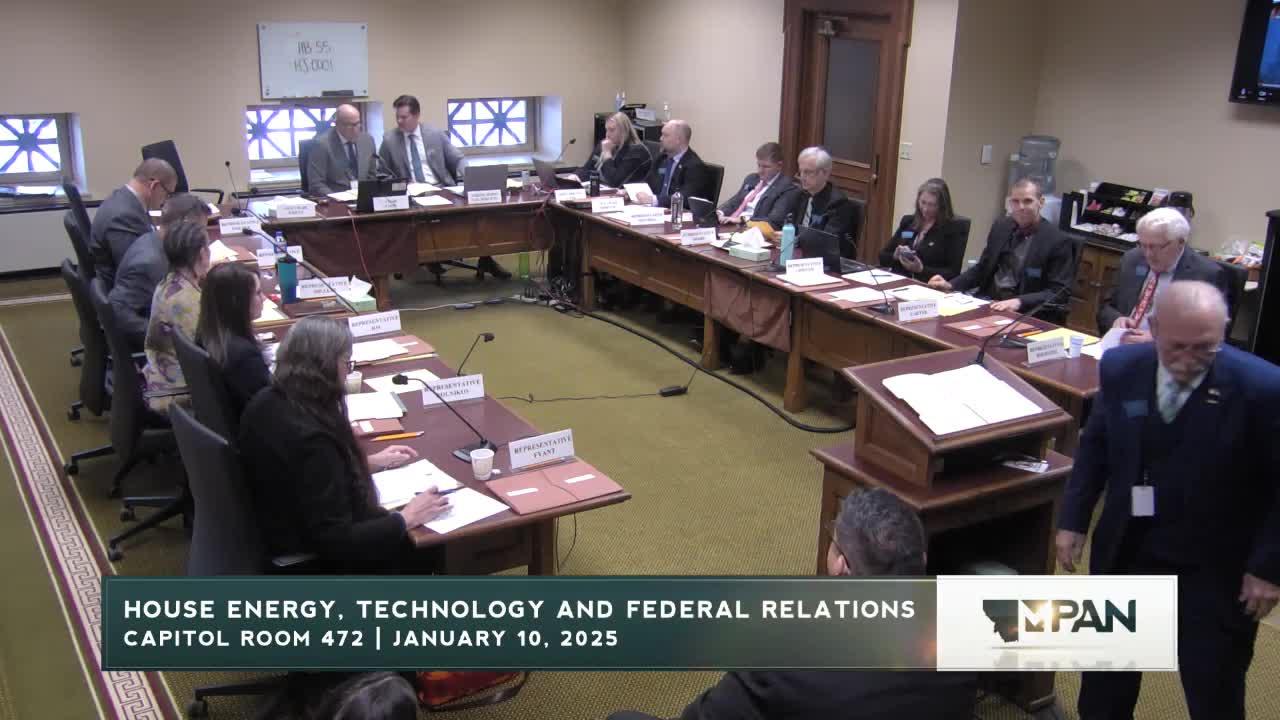Lawmakers hear HB 55 to speed energy procurement; opponents warn it curtails public review
Get AI-powered insights, summaries, and transcripts
Subscribe
Summary
Representative Gary Perry presented House Bill 55 to reorganize state integrated resource planning and competitive solicitation procedures, including an independent evaluator, with the stated goal of accelerating procurement to meet a projected near‑term capacity shortfall.
Representative Gary Perry, sponsor of House Bill 55, told the House Energy, Technology and Federal Relations Committee the bill is intended to overhaul Montana’s resource‑planning and procurement process to accelerate new supply and provide independent oversight.
Perry said the changes aim to increase transparency and protect ratepayers while shortening lead times so the state can meet forecasted demand. “Montana right now is in an energy crisis. We're being projected to need 75 to 100 megawatts of power in the next 6 to 10 years,” Perry said during his opening remarks. The bill would require an independent evaluator (IE) to be selected from a DEQ‑maintained list to oversee competitive solicitations, require utilities to hold public meetings and allow the Public Service Commission to adopt rules and review integrated resource plans (IRPs) on a shortened timeline.
Supporters. Sen. Daniel Zolnikov, who chaired the interim select committee that shaped the bill, described the IE and competitive‑bid framework as tools to “clear out that black box” in procurement and reduce litigation. Northwestern Energy’s Alan Olson and renewable‑sector representatives said they largely back the bill’s goals and the IE concept.
Opponents and concerns. Several consumer, renewable and environmental groups opposed HB 55 as written, urging substantive amendments. Tim Holmes of the Northern Plains Resource Council said the bill “cuts public participation” and asked that the public comment period be restored to 60 days from the 45 days proposed. Kyle Unruh of Renewable Northwest and McKenna Sellers of the Montana Renewable Energy Association recommended restoring the 60‑day comment period and requiring at least two PSC public meetings. Nick Fitzmaurice of the Montana Environmental Information Center raised concerns that the bill limits the IE’s scope, does not bar conflicts of interest for evaluators, and could permit advisory‑committee meetings to be closed by default.
Specific contested provisions described in testimony: - Public comment period: bill drafts reduce the IRP public comment window from 60 to 45 days; multiple witnesses asked to restore 60 days. - Independent evaluator scope: some witnesses asked the statute not to tie the IE only to preapproval procedures (citing “698421” in testimony) and to require public access to the IE report. - Technical advisory/resource planning committee meetings: language could allow those meetings to be closed by default; opponents urged meetings be open except where law permits closure for trade secrets. - Review timelines and staffing: the bill sets a 120‑day PSC review deadline; sponsors pointed to a fiscal note that includes a $200,000 annual appropriation for PSC staffing and $75,000 to assist DEQ in establishing an IE list.
Informational witnesses. Sonya Nowakowski, Director of the Department of Environmental Quality, said the DEQ has authority under the bill text to solicit and maintain a list of independent evaluators and to evaluate qualifications. Trevor Graff of the Public Service Commission said the PSC’s rules from 2019 have not yet been tested in a filing; the commission has not had a case using those rules to date.
Committee discussion and possible amendments. Committee members asked whether changes proposed were premature given the PSC had not yet processed an IRP under the 2019 rule set; sponsors and supporters replied the bill reflects interim committee compromise and includes an appropriation to help the PSC meet the proposed timelines. Representative Carter and others discussed whether restoring the public comment period to 60 days and making advisory‑committee meetings open by default would be acceptable amendments; the sponsor indicated he would consider such committee-driven amendments.
Action. The committee held a public hearing; no formal committee vote on HB 55 was recorded in the transcript. The bill remains before the committee for amendment and further consideration.
